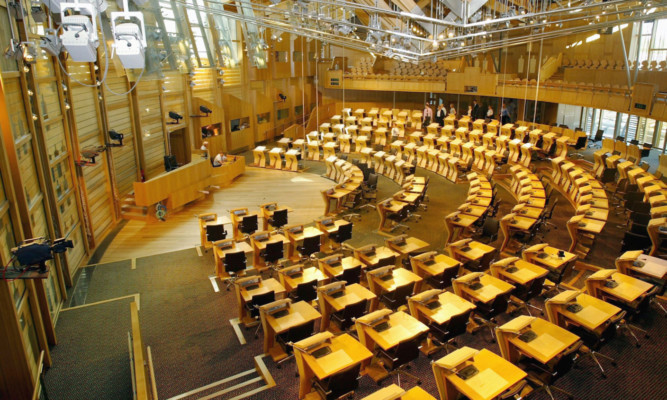
Change on the horizon as MSPs demand greater Holyrood scrutiny.
The vast queues waiting to enter the Scottish Parliament were a welcome backdrop for BBC presenter Gavin Esler as he went on air to wax lyrical about the Scots’ love for democracy with a year to go until the referendum.
As it turned out, the scene in September 2013 wasn’t people clamouring to get into the debating chamber, but rather a tapestry exhibition in the Holyrood entrance hall.
The public’s interest in the Scottish Parliament has ebbed and flowed since it was created in 1999, with the focus now at least on what happens between the four walls rather than the building itself.
How Holyrood operates has come sharply into focus since the SNP won a historic majority in 2011, with a running fault line on the independence of committees now dominated by Nationalists.
“Short memories” is the usual comeback from the SNP who remember similar dominance of committees during the Labour/Lib Dem coalition years.
However, all sides are agreed that a scrutiny shake-up is needed as we await more legal and economic powers coming to Holyrood as a result of the Smith Commission deal.
Presiding Officer Tricia Marwick has made a number of changes since taking on the role of chief parliamentary referee in 2011, with the introduction of a topical question period and an extra main chamber session the most welcome of these.
Her next plan, the election of committee conveners, is another step in the right direction according to most Holyrood observers but there are more radical ideas out there to improve the way those running our country are held to account.
John Park, former Labour MSP and now Assistant General Secretary of the Community union, is calling for the committee convenor role to be given more importance and cash.
He said: “One of the most frustrating aspects of my time in Parliament was the lack of any real independence in the committees.
“Independently criticising government policy as a member of the governing party is certainly one way of minimising your chances of a ministerial career.
“This has become more visible since the SNP majority in 2011 but before my time in parliament I understand that it was very similar when
Scottish Labour and the Liberals had collation majority between 1999 and 2007.
“There needs to be serious consideration given to establishing an alternative parliamentary career structure for politicians to follow.
“Talking about the remuneration of politicians doesn’t feel too clever in the current political climate.
“This isn’t about giving all MSPs more money, this is about good governance and the establishment of a salary structure to recognise the independence of parliament and the role played by committee convenors.”
Mr Park also wants to see experts indirectly elected onto the committees and more involved in the process of scrutinising new laws.
Whatever shape or form the committees take in the future, we may not get to see all of their work.
Figures from the 2010/11 session of Holyrood showed only 28% of committee sessions at Holyrood were held entirely in public, down from 64% when the parliament first opened in 1999.
It is this sort of trend which worries Duncan McNeil, Labour MSP and convenor of the health committee, who fears there has been little desire to work out what Holyrood has got right and wrong since it opened.
He said: “We have the building but do we have the parliamentary capacity?
“Post-legislative scrutiny is about as rare as hens’ teeth and I can’t think of the last time we saw a committee bill.
“There is a lot of good work that goes on across all of the committees but we do need to be asking serious questions about whether we are doing what we set out to achieve in 1999. This is not about the political divisions.
“We’ve had coalition, minority where incidentally I think the committees worked best and now majority governments, so we’ve had experience of every scenario and we need to work out if we have come up to scratch, it is not a conversation that people seem to want to have.
“Never mind about Smith and the challenges that brings, we need to get the house in order now.”
Former Cabinet Secretary and SNP Chief Whip, and current convenor of the Devolution Committee, Bruce Crawford, said changes were needed to reflect the changes proposed by the Smith Commission but added there were deeper issues.
He said: “I think we really have to improve the intergovernmental relations. Too many UK Government ministers, such as Iain Duncan Smith, have been reluctant to come to the committees and explain their policies.
“Also, a lot of the good work the committees do needs to be made more visible.”
The politics of scrutinising the government or big issue of the day was best illustrated last year when Murdo Fraser’s Economy, Energy and Tourism Committee decided against producing a report on its inquiry into the referendum as the Yes and No supporting MSPs knew they would never agree on its contents. But things have improved, according to the Tory MSP.
He said: “There was a change, a change for the worse, when the majority government was elected in terms of how robust some of the committees were with their treatment of SNP ministers. But I get the sense that things have improved since, certainly post-referendum, with more difficult questions now being asked.
“There is an issue with Scotland in terms of the pool of people we can call and use as experts.
“The number of people who are qualified, available and willing to work at the rates we pay for expert advice is also an issue.”

Enjoy the convenience of having The Sunday Post delivered as a digital ePaper straight to your smartphone, tablet or computer.
Subscribe for only £5.49 a month and enjoy all the benefits of the printed paper as a digital replica.
Subscribe